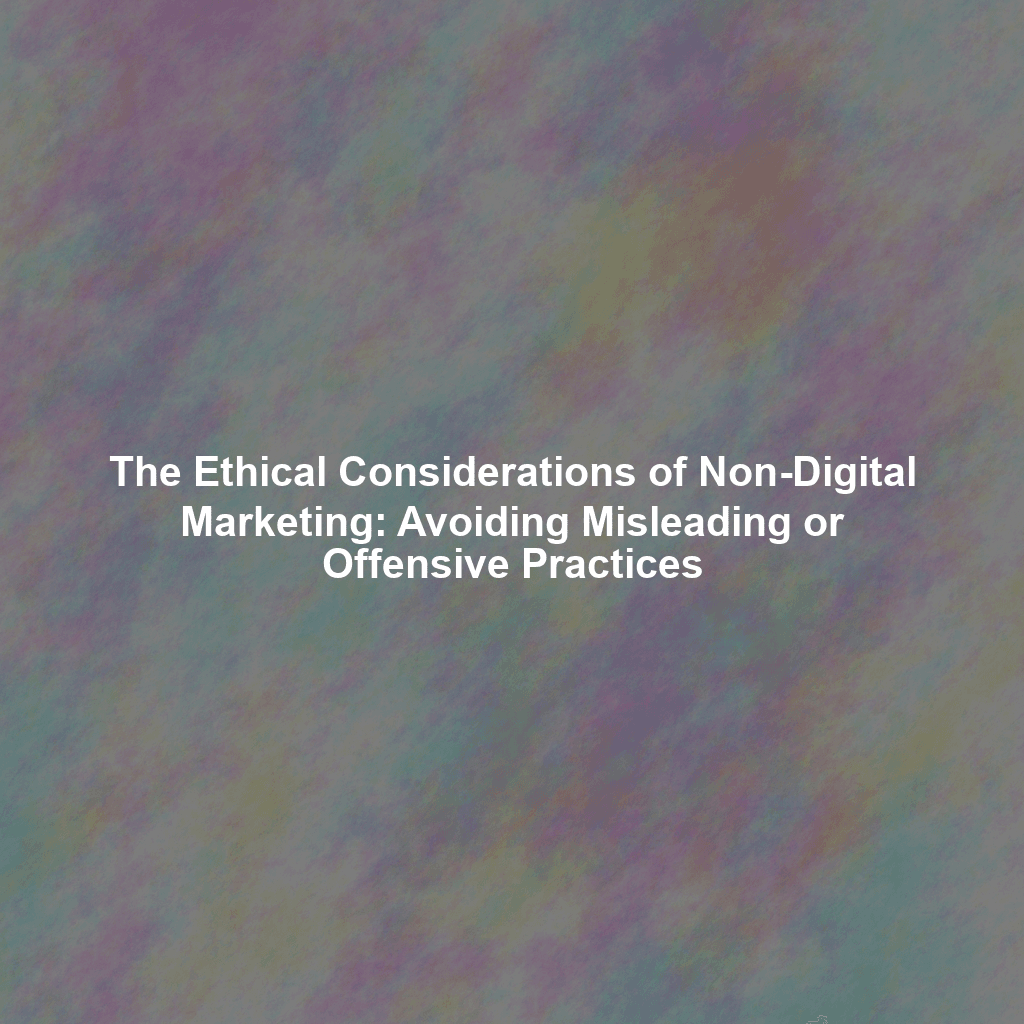In a world increasingly dominated by digital strategies, it’s easy to overlook the power and reach of non-digital marketing. From print ads to direct mail campaigns, from billboards to in-person events, offline channels offer unique opportunities to connect with target audiences. However, with this power comes a significant responsibility: to conduct these campaigns ethically. This guide delves into the ethical considerations of non-digital marketing, providing practical insights on avoiding misleading or offensive practices and ensuring consumer privacy is respected. Let’s navigate the ethical landscape of offline promotion together.
Why Ethics Matter in Non-Digital Marketing
Ethical marketing isn’t just about avoiding legal trouble; it’s about building trust with your audience. In the offline world, where direct interaction may be limited or nonexistent, the impressions you make are crucial. Unethical practices can quickly damage your reputation, leading to lost customers and a decline in brand loyalty. Conversely, a commitment to ethical marketing fosters goodwill, strengthens customer relationships, and ultimately contributes to long-term success.
Building Trust and Brand Loyalty
Consumers are more likely to engage with brands they trust. Ethical non-digital marketing shows respect for your audience, demonstrating that you value their intelligence and autonomy. This, in turn, fosters a sense of loyalty and encourages repeat business.
Protecting Your Brand Reputation
A single unethical campaign can have lasting negative consequences. Word-of-mouth spreads quickly, especially when it involves complaints about misleading advertising or privacy violations. Maintaining an ethical stance protects your brand from negative publicity and reputational damage.
Avoiding Misleading Advertising in Offline Channels
Misleading advertising can take many forms, but it always boils down to presenting false or incomplete information to deceive consumers. Here are some specific areas to consider in your non-digital campaigns:
Accuracy in Claims and Representations
Every claim you make in your offline advertising should be accurate and verifiable. Avoid exaggerating the benefits of your product or service, and be transparent about any limitations. For example, if you’re advertising a sale in a flyer, clearly state the terms and conditions, including any exclusions or restrictions.
Clear and Unambiguous Language
Use clear, concise language that is easy for your target audience to understand. Avoid jargon, technical terms, or overly complex sentence structures. The goal is to ensure that consumers can easily grasp the main message of your advertisement without being misled or confused.
Avoiding Bait-and-Switch Tactics
Bait-and-switch tactics involve advertising a product at a very low price to lure customers into a store or event, only to then pressure them into buying a more expensive alternative. This practice is not only unethical but also illegal in many jurisdictions. Always ensure that the advertised product is readily available and that your sales staff are not incentivized to push customers towards other options.
Honest Pricing and Discounts
Be upfront about pricing and discounts. Avoid inflating the original price of a product to make a discount appear larger than it actually is. Clearly state the discounted price and the duration of the offer. Transparency in pricing builds trust and avoids accusations of deception.
Respecting Consumer Privacy in Non-Digital Marketing
While digital marketing often raises concerns about data privacy, non-digital methods also require careful consideration of consumer rights. Direct mail campaigns, in-person events, and even flyer distribution can involve collecting and using personal information.
Obtaining Consent for Data Collection
If you’re collecting personal information through offline channels, such as mailing lists or event registration forms, always obtain explicit consent from individuals. Clearly explain how their information will be used and give them the option to opt out.
Protecting Data Security
Once you’ve collected personal information, it’s your responsibility to protect it from unauthorized access or disclosure. Implement appropriate security measures to safeguard your data, both in physical and digital formats. This includes secure storage, access controls, and employee training on data protection practices.
Being Transparent About Data Usage
Be transparent with consumers about how you use their personal information. Provide a clear and accessible privacy policy that explains your data collection practices, the purposes for which you use the data, and how individuals can access, correct, or delete their information.
Complying with Privacy Regulations
Familiarize yourself with relevant privacy regulations in your jurisdiction, such as GDPR or CCPA. Ensure that your non-digital marketing practices comply with these regulations, particularly when it comes to data collection, storage, and usage.
Avoiding Offensive or Harmful Content
Marketing materials have the power to shape perceptions and influence attitudes. It’s crucial to ensure that your non-digital campaigns are not offensive, discriminatory, or harmful to any group or individual.
Sensitivity to Cultural Differences
Be mindful of cultural differences and avoid using stereotypes or imagery that could be considered offensive or insensitive. Conduct thorough research on your target audience to understand their values, beliefs, and cultural norms.
Avoiding Sexist or Discriminatory Language
Avoid using language or imagery that is sexist, discriminatory, or promotes harmful stereotypes. Ensure that your advertising reflects diversity and inclusivity.
Promoting Responsible Content
Avoid promoting products or services that are harmful or unethical, such as those that exploit vulnerable individuals or contribute to social problems. Consider the potential impact of your advertising on society and strive to promote responsible and ethical consumption.
Conclusion: A Commitment to Ethical Excellence in Offline Marketing
Ethical non-digital marketing is not merely a matter of compliance; it’s a strategic imperative. By prioritizing honesty, respect, and responsibility in your offline campaigns, you can build trust with your audience, protect your brand reputation, and contribute to a more ethical marketing ecosystem. Embracing these principles will not only benefit your business but also create a more positive and sustainable relationship with your customers. Remember, the ethical compass should always guide your marketing decisions, ensuring that your offline strategies are both effective and morally sound.
 Skip to content
Skip to content

